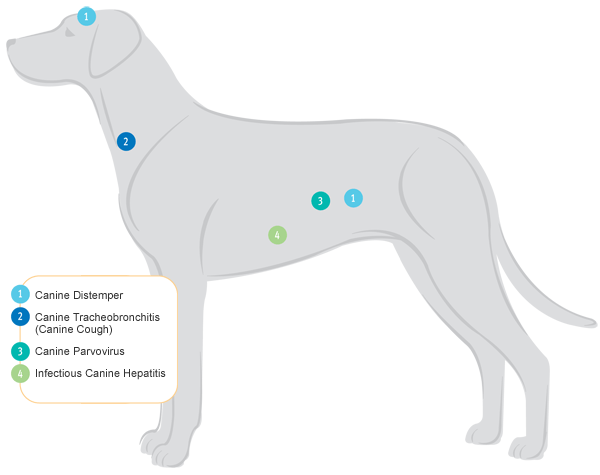
Ph: 8086 0274
1/13 Loop Road, Werribee
Diseases and Vaccinations

Protecting your best friend
One of the most important things you can do to give your dog a long and healthy life is to ensure that he is vaccinated against common canine diseases. Your dog's mother gave her puppy immunity from disease for the first few weeks of life by providing disease-fighting antibodies in her milk. After that period it's up to you, with the help and advice from us – to provide that protection.
How do vaccines work?
Vaccines contain small quantities of altered or "killed" viruses, bacteria or other disease-causing organisms. When given, they stimulate your dog's immune system to produce disease-fighting cells and proteins – or antibodies – to protect against disease and viruses.
When should my dog be vaccinated?
The immunity that a puppy gains from its mother's milk begins to diminish sometime after 6 weeks of age. It is then time to begin the initial vaccinations, usually a course of 2 or 3 injections given 3 to 4 weeks apart. Thereafter, your dog will require repeat vaccination at regular intervals for the rest of their life. As vaccines vary in the duration of immunity they provide, above all, follow the vaccination schedule recommended by us.
Which vaccinations should my dog receive?
We believe that your pet should be protected against those diseases which are most common, highly contagious and which cause serious illness. Such diseases include Canine Distemper, Infectious Canine Hepatitis, Canine Parvovirus and Canine Tracheobronchitis (Canine Cough/Flu). Other vaccinations may be recommended, based on your veterinarian’s evaluation of the risks posed by such factors as your dog’s particular heredity, environment and lifestyle.
Canine Distemper
Vaccination against this often fatal, hard-to-treat disease is absolutely essential. Highly contagious, it is spread by discharges from the noses and eyes of infected dogs. Symptoms can include listlessness, fever, coughing, diarrhoea and vomiting; convulsions and paralysis may occur in the disease's final stages. The distemper virus attacks many organs, including the nervous system, which may be permanently damaged, even if the dog recovers.
Canine Tracheobronchitis (CANINE COUGH)
Just as with the human common cold, this respiratory-tract infection is easily transmitted from one dog to another, so vaccination is imperative if your pet will come in contact with many other dogs in such situations as obedience training or boarding at a kennel. Caused by various airborne bacteria and viruses, including Canine Parainfluenza virus, Canine Adenovirus Type II and Bordetella bronchiseptica, you'll first notice its onset by your dog's dry, hacking cough. However, just like with us we can still catch the flu when we have had our flu shot, dogs can still have a cough but it will be shorter than if they were not vaccinated against these viruses.
Canine Parvovirus
Very contagious, debilitating and widespread, the disease caused by this virus emerged in many parts of the world only in 1978. Spread through infected faeces, the highly resistant virus can remain in the environment for many months-years. Symptoms include high fever, listlessness, vomiting and bloody diarrhoea. Vaccination is the only certain method of preventing this potentially fatal disease, which is most severe in young pups and elderly dogs.
Infectious Canine Hepatitis
Caused by Canine Adenovirus Type I, this disease is transmitted among dogs by contact with secretions, such as saliva, infected urine or faeces. Its symptoms are similar to those of the early stages of distemper. Causing liver failure, eye damage and breathing problems, the course of this disease can range from mild to fatal. Vaccination remains the best protection.
Other Vaccinations
After evaluating your dog's particular situation and risk factors, we may also recommend vaccination against other infectious diseases. These might include:
-
LEPTOSPIROSIS, a bacterial disease which attacks the kidneys and liver that potentially affects dogs in certain geographical areas and only for particular strains of the disease.
How effective is vaccination?
Like any drug treatment or surgical procedure, vaccinations cannot be 100% guaranteed. However, used in conjuction with proper nutrition and acceptable sanitary conditions, vaccination is clearly your pet's best defense against disease. Plus, when you consider what treating a serious illness can cost you and your beloved dog in terms of both money and distress, prevention through vaccination is extremely cost-effective.
